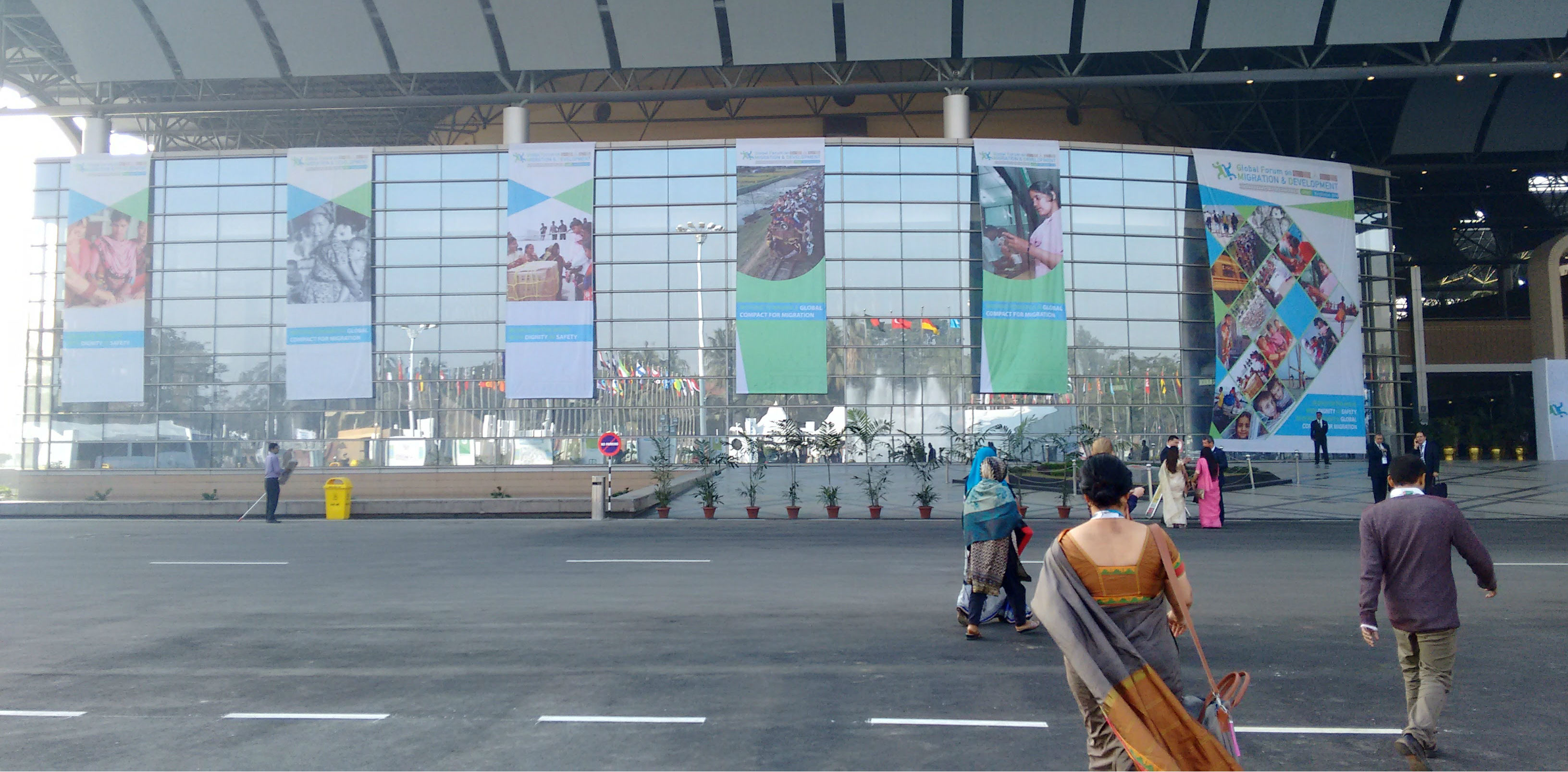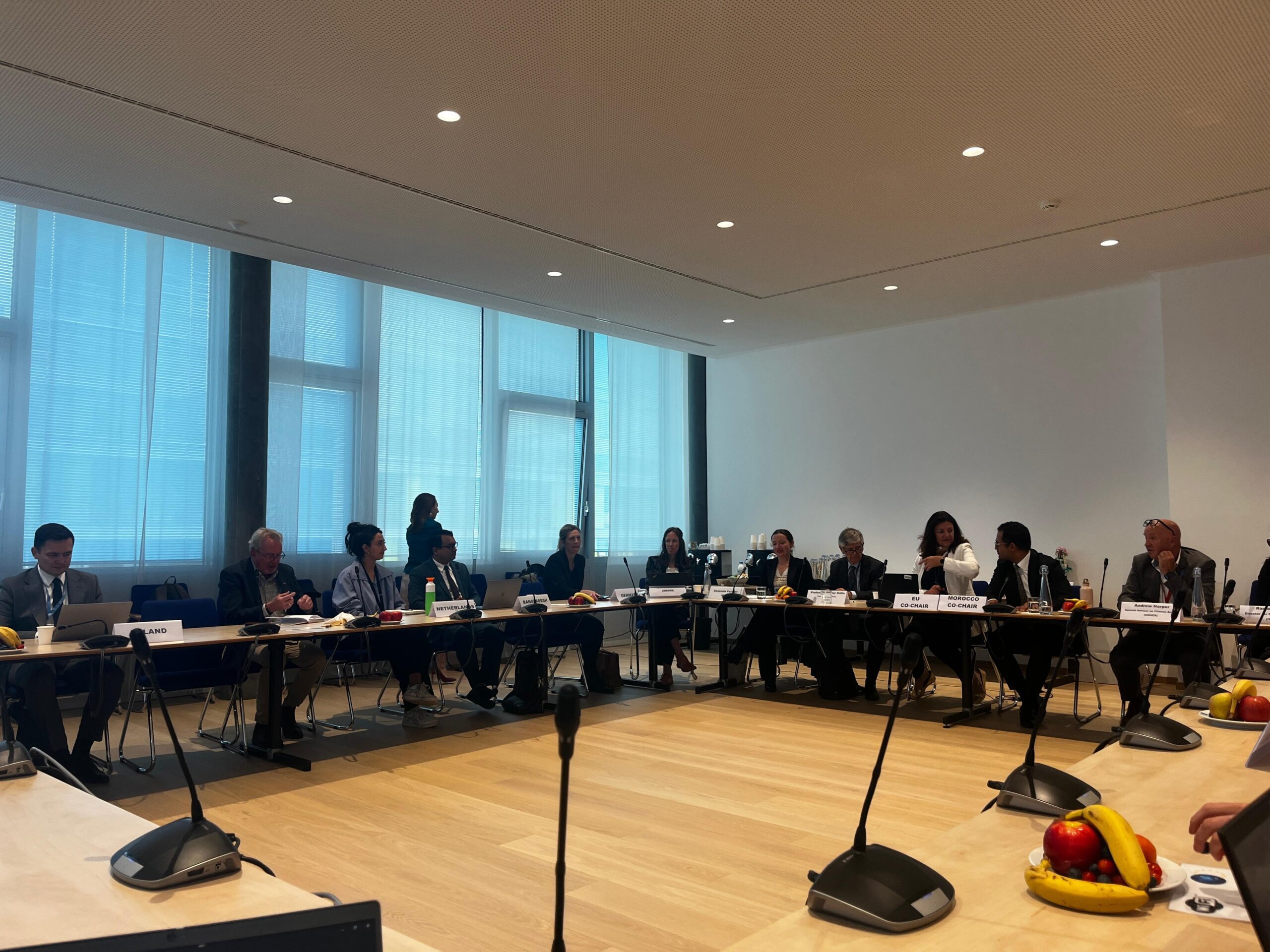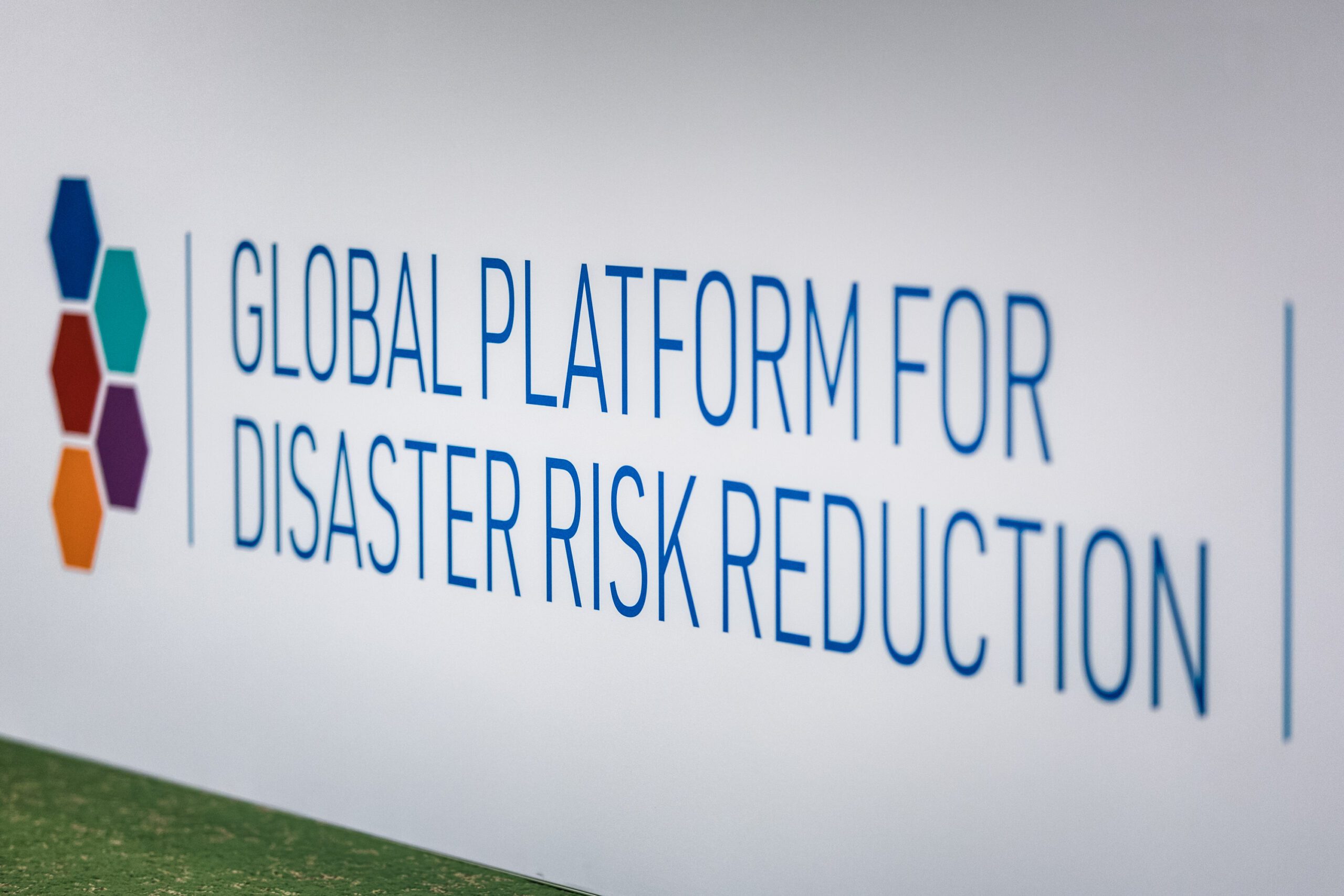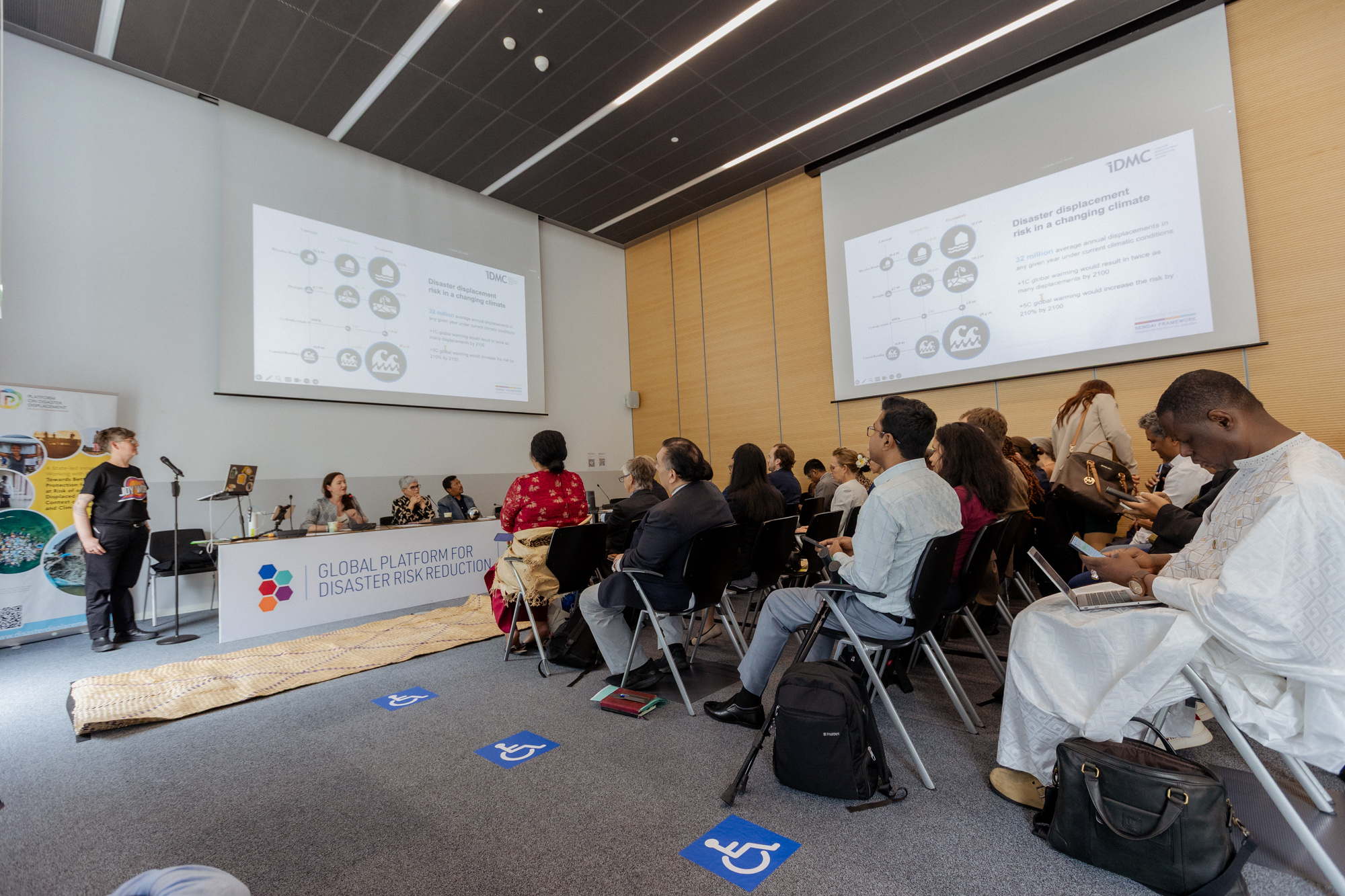The Platform on Disaster Displacement and the Global Forum on Migration and Development, Dhaka, Bangladesh

Dhaka, Bangladesh 8-12 December – PDD attended the Global Forum on Migration and Development 2016, both the Civil Society Days and the Government Days, and participated by engaging in Roundtable 3.1 and holding a side event.
Disaster Displacement at the 9th GFMD Summit Meeting, Dhaka, Bangladesh
Both during the Civil Society Days and the Government Days, the issue of displacement in the context of disasters and the adverse effects of climate change was mentioned and referred to by several delegates, including the work of the Platform on Disaster Displacement (PDD), the Follow-up to the Nansen Initiative.
Under Theme 2: Doing Protection of Migrants on the Move, the Civil Society Days focused on i)Session 2.1 Protecting migrants in all crises, in transit and at borders, and ii)Session 2.2 Development solutions for forced displacement, including by conflict, disaster and climate change.
These discussions concluded that i)instead of externalizing deterrence and migration “control” it was recommended to externalize migrant “protection”, and that ii)in including disaster displacement issues into the Global Compact on Migration, one should not reinvent the wheel, but draw on the experience of the Nansen Initiative/the Platform on Disaster Displacement and the Migrants in Countries in Crisis Initiative (MICIC).
Several members of the Platform’s Advisory Committee such as Action Aid Bangladesh, APRRN, COAST/EquityBD, ICMC, ICMPD, IOM, IFRC, OHCHR and UNHCR made significant contributions to the discussions and advancing disaster displacement issues.
On the last Civil Society Day, COAST/EquityBD together with Action Aid Bangladesh, CANSA and NRC organized a Seminar on ‘Climate Displacement: Promoting and Protecting the Climate Migrants’ Rights’ to which the Platform was invited. The seminar was chaired by Dr. Muhammad Hasan Mahmud, Member of Parliament of Bangladesh and Chairman of the Parliamentary Standing Committee on the Ministry of Environment and Forests, who said “Climate Change is not a threat in Bangladesh, climate change is a reality in our country”. The focus of the Seminar was thus on regional disaster displacement realities and on regional and international responses and solutions.
At the Government Days, disaster displacement issues and challenges featured right from the Opening Ceremony all throughout and were therefore reflected prominently in the GFMD Chair’s Summary. In the Opening Ceremony, climate change was identified as a major driver of migratory movement by IOM Director General, William L. Swing.
Roundtable 3: Governance of Migration and Development discussions focused on i)RT 3.1 Migrants in situations of crises: conflict, climate change and natural disasters, and ii)RT 3.2 Principles, Institutions and Processes for safe, orderly and regular migration.
RT 3.1 was of direct relevance to the work and strategic objectives of the Platform on Disaster Displacement, since one objective of the Roundtable was to ‘refer to the current state of the art and promote ways to provide access and admission to territory, safety and to provide protection and assistance, including temporary or long-term legal status, to migrants in countries experiencing crises and cross-border disaster-displaced persons’.
The Philippines, Chair of the Roundtable and member of the PDD Steering Group explained that the Nansen Initiative Protection Agenda provides guidance to address the needs of cross-border disaster-displaced persons and that the work of the Platform supports efforts to help migrants in distress. The Platform’s Chair, Germany, recommended for the Global Compact for Migration to draw on the work of the Platform and indicated that Germany’s Chairmanship was guided by the implementation of the Protection Agenda. Germany’s focus is to enhance the use of identified effective practices for admission, stay and non-return of cross-border disaster-displaced persons at the regional and sub-regional levels.
Other Roundtables reflected the messages of RT 3.1 on disaster displacement issues and on the already existing knowledge and mechanisms such as the Platform on Disaster Displacement and the Nansen Initiative Protection Agenda (RT 3.2). Others emphasized the vulnerability of migrants due to the consequences of climate change as well as the unprecedented focus on displacement in the context of climate change at COP22 was also noted (RT 2.2).
PDD Steering Group members such as Bangladesh, Costa Rica, Mexico and Senegal referred to the work of the Platform/the Nansen Initiative in their interventions and, echoing Germany, recommended for PDD to be included when developing the Global Compact for Migration. Non-Steering Group Members, such as Argentina, Algeria, Chile, Ethiopia, India, Norway, Russia, Togo, Tuvalu and the USA also spoke to the issue of disaster displacement and highlighted several initiatives, including MICIC; a draft UN Resolution on the legal protection of persons displaced by the impacts of climate change or natural disasters; plans for developing a Guide to admission and stay in South America; and humanitarian visas, among others.
Besides the substantive segment of the Global Forum, disaster displacement and PDD were also the topic of several side events, e.g. the Work Bank’s ‘Migration and Development: A Roadmap to a Global Compact’ and also ‘The Migrants in Countries in Crisis Initiative – Moving to Action’ organized by MICIC, the Philippines and the USA. Delegates noted The Platform’s value and potential of significantly enhancing the Global Compact on Migration. The Platform also organized a side event to present PDD’s work and strategic priorities and to identify challenges and opportunities for enhanced action and policy development in situations of displacement linked to the adverse effects of disasters and climate change. Please read the next section for more details.
Finally, the Platform on Disaster Displacement was included in the overall Summary of the GFMD Chair, H.E. Md. Shahidul Haque, Foreign Secretary of Bangladesh as well as in the Roundtable 3 Summary presented by Mr. Michel Latschenko, Special Envoy for Migration and Asylum, Ministry of Foreign Affairs, Belgium. Both statements recommended to draw on the work of the Platform/the Nansen Initiative in developing the Global Compact for Migration, and encouraged the dissemination and application of this work. Please download the full summaries from the right margin.
Side Event: PDD and GFMD, Monday 12 December, Dhaka
The side event was an opportunity to present the work and strategic priorities of the Platform on Disaster Displacement and to identify challenges and opportunities for enhanced action and policy development in situations of displacement linked to the adverse effects of disasters and climate change. The Panel consisted of:
-
H.E. Markus Ederer, State Secretary of the Federal Foreign Office, Federal Government of Germany
-
H.E. Md. Shahidul Haque, Foreign Secretary, Ministry of Foreign Affairs, Government of Bangladesh
-
Ms. Michele Klein Solomon, Senior Policy Adviser, IOM – Moderator
- Ms. Gisella Yockchen, Director, General Directorate of Migration and Immigration, Government of Costa Rica
- Mr. Sarat Dash, IOM Chief of Mission in Bangladesh
- Mr. Michele Cavinato, Head of the Asylum and Migration Unit, Division of International Protection, UNHCR
- Mr. Atle Solberg, Head of the PDD Coordination Unit – Moderator
The first part of the side event introduced the PDD as a state-led multi-stakeholder-driven Platform and opened the discussion on disaster displacement. Established in 2016 by Germany (Chair) and Bangladesh (Vice-Chair), the Platform on Disaster Displacement aims at following up on the work started by the Nansen Initiative and implementing the recommendations of the Nansen Initiative Protection Agenda, endorsed by 109 governmental delegations in October 2015. Under the leadership of Germany and Bangladesh, the Platform focuses on four Strategic Priorities:
I. Address knowledge and data gaps;
II. Enhance the use of identified effective practices and strengthen cooperation among relevant actors to prevent, when possible, to reduce and to address cross-border disaster-displacement at the national, regional and international levels;
III. Promote policy coherence and mainstreaming of human mobility challenges in, and across, relevant policy and action areas
IV. Promote policy and normative development in gap areas
H.E. Markus Ederer, State Secretary of the Federal Foreign Office, Federal Government of Germany explained that “Not all disaster displacement and other type of human mobility can be avoided or prevented. Not all the risks of displacement can be eliminated. In a context where we are witnessing an unprecedented level of human mobility at international level, it has become clear that such human mobility, whether forced or not, needs to be better managed and better governed, based on global approaches, responsibility-sharing and global solutions.”
People will continue to move in response to the adverse effects of climate change and disasters, continued to explain H.E. Ederer. The link between the adverse effects of climate change, disasters and displacement has already been recognized in recent global policy processes and outcome documents such as the Sendai Framework, the 2030 Sustainable Development Agenda, the UNFCCC and the Paris Agreement, and at the World Humanitarian Summit. If implemented, all of these measures seeking to better manage risks and address the root causes of contemporary population movements will reduce the risk of displacement, internally and across borders. The implementation of the Protection Agenda for cross-border disaster-displaced persons is complementary to such efforts to reduce risks and address disaster displacement.
H.E. Md. Shahidul Haque, Foreign Secretary, Ministry of Foreign Affairs, Government of Bangladesh drew the attention of the public to a case in point, namely the Delta region in Bangladesh. Deltas and their populations are facing growing problems of coastal flooding, wetland loss, shoreline retreat and loss of infrastructure, and climate change is making the situation worse. It is important thus to work together with the Delta Coalition and link up their work with that of the Platform.
The second part of the side event discussed regional and global effective practices for the protection of disaster displaced persons. Ms. Gisella Yockchen, Director, General Directorate of Migration and Immigration, Government of Costa Rica, introduced the “Guide to Effective Practices for RCM Member Countries: protection for persons moving across borders in the context of disasters” adopted at the XXI Regional Conference on Migration (RCM) in Honduras, November 2016. The RCM Guide is a unique and unprecedented document covering the protection needs of cross-border disaster-displaced persons. It is a Guide on admission and stay with the purpose of sharing information on the use of humanitarian protection measures that RCM Member Countries may apply on a temporary basis in response to the needs of cross-border disaster-displaced persons. During the Hurricane Otto crisis, Ms. Yockchen said, Costa Rica was well informed and prepared to respond due to the work of the RCM and the Nansen Initiative on the Guide.
Mr. Sarat Dash, IOM Chief of Mission in Bangladesh and Mr. Michele Cavinato, Head of the Asylum and Migration Unit, Division of International Protection, UNHCR, presented their organizations’ work on disaster displacement. Mr. Dash focused on the work of IOM in the Asia-Pacific region, explaining that the region accounted for 49% of the world’s total damage due to natural hazards in the last century and that in 2015, 85% or 16 million of the global total of displaced populations due to natural hazards were recorded in Asia. IOM has a diversified project portfolio in the region, focusing on research, policy dialogue, capacity building, building partnerships and information sharing.
Mr. Cavinato clarified that persons displaced across borders in the context of a disaster may find themselves in a refugee-like situation while international refugee law does not recognize them as refugees as long as persecution and violence are absent. However, States may determine that they qualify as refugees where persecution occurs in the aftermath of a disaster, e.g. as a consequence of a breakdown of law and order, or when a disaster occurs amidst an armed conflict which makes it impossible for humanitarian actors to access and provide assistance to disaster survivors,. Nevertheless, the protection needs of disaster displaced persons are real, and UNHCR is involved in several efforts to address such needs: developing and revising IDP provisions, the Temporary Protection and Stay Arrangements (TPSA) and the Planned Relocation Guidelines; implementing the Brazil Declaration (Cartagena 30+); and ensuring protection policy coherence through the Global Protection Cluster (GPC).
Photo Credits: © 2016 IOM
Useful Links
Read the GFMD Chair’s Summary
 Loading...
Loading...
Read the Roundtable 3 Summary
 Loading...
Loading...
Download the Side Event Flyer (EN)
 Loading...
Loading...
Read the Protection Agenda
 Loading...
Loading...
Download the GFMD Agenda
The Civil Society Days
 Loading...
Loading...
The Government Days
